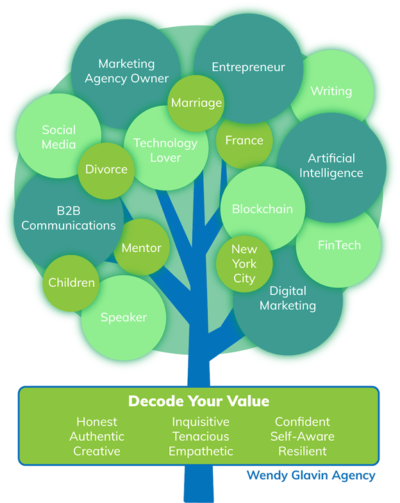Rediscover Your Life Skills to Live the Life You Truly Want
 Wendy Glavin, Founder & CEO, Wendy Glavin Agency
Wendy Glavin, Founder & CEO, Wendy Glavin Agency
Now, that we’re in 2021, what’s changed for you? Many of my friends and colleagues in the U.S. and abroad say they’re still worried about staying healthy and safe, are concerned about the availability of the COVID-19 vaccines, are stressed about job and income loss and feel sad, isolated or in-limbo.
Since most people are hardwired with a “negativity bias” all the events of 2020, have thrust us into continued negative thinking, like, what we don’t have, what we don’t want, where we don’t want to be and how we don’t want to feel. Other self-limiting beliefs include, I’m too old, or young, too poor or scared, too busy or not disciplined enough, too lazy or a perfectionist, and other assumptions based on how we were raised or taught.
Whether it’s how you’re wired or your upbringing, we can change our thoughts. For example, one lesson I learned during physical therapy was, “Change a thought, move a muscle.” My guess is when you take a walk, a run or do some type of exercise, you feel better.
Another lesson I learned when I was a young adult was to build on my strengths. My dad used to say, what you did in the past is proof of what you can do in the future. This led me to accept jobs I might not have otherwise taken. Later, I worked with clients outside industry sectors in which I worked. But I read, learned and continue to work in a wide variety of industry sectors in technology.
When I was working in-house at my first agency job after several years, I asked for a promotion. But my direct boss said, you don’t know all the things you need to know. That powerful statement stayed with me over time. I learned what I needed to do to move to the next level. When you’re young, you may feel like you know a lot, but you don’t. However, if you’re determined to learn, you will.
What We Know but Tend to Forget
Regardless of where you are in your career, you focus on what you’re doing and try to move forward. But even more important is reflecting on how far you’ve come and your progress along the way. Perhaps it’s a new project, a new client, a sponsor, more followers on social media, a published article, VC funding, and the list goes on.
But, more often than not, once you’ve accomplished one goal, you’re on to the next. Instead, shift your focus into what you’ve done throughout your life in your 20’s, 30’s, 40’s or 50+ years to discover your true potential and purpose.
I’ve always drawn on my life experiences. My dream as a child was to become a lawyer or an actor. My passions were swimming, skiing, ice-skating, and generally, being around people. I’ve always loved fashion and décor. After traveling and living abroad, I developed a European sensibility, which continues to stay with me. After marriage, children and moving, I learned the significance of being resilient as things always change. If you’re used to taking risks, doing so is easier than those who are more comfortable with the status quo.
8 Tips to Move Forward While Staying In-Place
- Reflect on your background and ask yourself questions like, what did I love to do? What was easy (and difficult) for me to learn? Who did I enjoy spending time with and why? Who were my favorite teachers, coaches and mentors? What did I learn from them? How and why did I choose my major in-college and did I complete my schooling and get a job in a profession I enjoyed? If not, why?
- What life experiences were most significant to you and why? What were your favorite destinations or places where you lived? What did you do for fun? What did you hate doing? What hobbies did you have? For example, did you enjoy cooking or baking, art, music, reading, writing, photography, history, sports, caring for pets or other leisure pursuits? Then, if you’re not continuing to do them, why not? With the way the world is now, “I can’t do them at home” is not an excuse.
- What are your core values? How did you realize that these were important for you? Were they something you were told to do or be or are they based on how you feel and think? If so, create a list of values for yourself. Then, ask other people with whom you trust or are close to, if they agree. Why? Because how you perceive yourself may be different than what you project to others.
- What relationships have been and are most important to you? Do you think you choose friends who are similar or different from you? Who were and are your mentors? What life lessons have you learned from them? As for relationships that didn’t work, what did you realize about yourself and was there anything you could have done differently? Since we can’t change others, how do you modify your communications with people with whom you have to work when you disagree? Or do you stay silent and harbor built-up resentment?
- What are your interests now? Are they the same as when you were younger? Have you expanded upon them and if so, in what ways? If not, how can you learn or relearn what you’re interested in? Why not read books or do research? Is there an online course you can take? Can you participate in events by asking questions or challenging underlying assumptions? Do you listen to others when they’re speaking or are you waiting to answer?
- The fifth question leads to your personality. Are you an extrovert or an introvert? Are you afraid of speaking up for fear of being wrong? Or do you feel confident enough to express yourself fully? Do you have a fear of failure? Or do you take risks and if things don’t work out, continue trying? Do you want to be liked by others? Or do you only care about what people who you’re close to think and feel?
- Do you enjoy the work you do or your career path? If so, what are some ways you’ve added to your skillset? If not, are you staying in your job because you’re afraid you won’t find something else or haven’t discovered your passion? If you do have a passion are you pursuing it? Perhaps, you’ve been furloughed or laid-off, and there are no jobs available, what can you do to stay abreast of your chosen profession? If not, what else can you do to create a new revenue stream?
- What have you learned from the past year? Have you taken advantage of all the new digital tools that are available to you? Without necessarily speaking about paying for new products or services, what are you doing to stay relevant? Are you joining groups on LinkedIn or Facebook? Are you going on live virtual shows? Are you participating in growing startups like Lunchclub and Clubhouse to exchange ideas with people? Are you listening to podcasts, watching educational YouTube videos or TED Talks?
None of these are rules. Instead, these are ideas to get you thinking about yourself. When you stay focused on all the external events, you’re choosing to live by circumstances out-of-your control. Clearly, everyone is affected by the pandemic. And, if you know someone who’s sick or a caregiver for a family member, life is tough, scary and exhausting (based on what I’ve been told).
In general, life during COVID is tough. Many people choose to do what the medical community, health experts and scientists recommend. While others don’t. Like anything, it’s up to you to decide how you want to live your life. My suggestions are based on what I do, looking within myself to find answers. There’s no right or wrong way to live; it’s up to you.
But, if you’ve followed my articles or heard me speak, then you know the process I use, and am sharing with you called Decode Your Value. Use my Life Skills Tree digital illustration as a guide and download your own Life Skills PDF to create your tree.
Last month, my team surprised me and sent me a framed photo of my Life Skills Tree. It’s over my desk which I see when I wake up, throughout the day and before I go to sleep. It inspires me to help others.
“The willingness to show up changes us. It makes us a little braver each time.” – Brene Brown, Daring Greatly
 About the Author: Wendy Glavin is a 30-year marketing communications veteran, a full-service agency owner, a published writer, a technology columnist and a global speaker. Her website is: https://wendyglavin.com/. Contact her at: wendy@wendyglavin.com.
About the Author: Wendy Glavin is a 30-year marketing communications veteran, a full-service agency owner, a published writer, a technology columnist and a global speaker. Her website is: https://wendyglavin.com/. Contact her at: wendy@wendyglavin.com.
